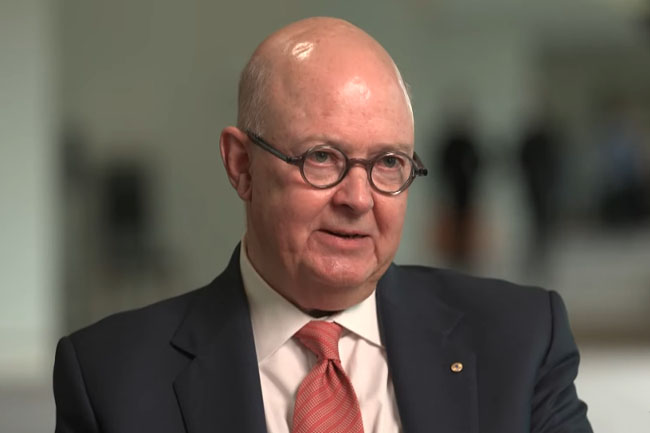A week in Canberra watching Abbott and Hockey rearranging the figures from the Budget to try to save their fragile political careers, as well as my access again to the private papers of Sir Keith Arthur Murdoch, were two good lessons in the fragility of power.
The conservative political party that Robert Gordon Menzies created in Australia about 100 years ago, that he chose to call "Liberal", is even more conservative than the British Conservatives of Winston Churchill.
David Cameron's result last week was surprising and shifty. He scored better, perhaps, with Rupert Murdoch banging the table in front of his staff at The Sun, some of whom were siding with Labor.
Perhaps, once again,
'It was The Sun wot won it!'
Meanwhile, here at home, Tony Abbott and his dopey crew of political "wannabes" have crossed into a form of reverse anarchism that gives all power to elected politicians and none to the voters. The Queensland Liberal-National Party was doing the same, with far less propriety, when the people sent them to the Opposition benches.
As for Keith Rupert Murdoch, who at least had the decency to decline a knighthood, unlike his beknighted father, has been as he has always been, the dark eminence that has wrecked all ideas about democracy.
Sir Keith Arthur Murdoch, his father, knew all about power and how to use it. His only son instead acquired the skills of a tyrant.
That showed in his father's private papers:
'There is only one secret to the production of a good newspaper, and that is infinite care and accuracy and constant attention to detail.'
And, another comment:
'The real thinking and leadership in Australia has to be done by the Australian people, informed by the truth in all matters.'
Rupert Murdoch: "Kill Miliband!" Kill Labour. Kill Labor. #ukpolitics #auspol pic.twitter.com/DAEYtT5Kdy
— Sir U Bet I'm Gone (@johndory49) May 6, 2015
Mind you, these words were not written to support the Labor Party. Murdoch senior was never anything other than a Menzies conservative, even though he would often brush aside complaints from Menzies. Keith much preferred Billy (William Morris) Hughes as prime minister.
He wrote personal messages to his staff in his own hand and chose to do so because he suffered from a speech defect.
As a newcomer at his Melbourne primary school, he was both shy and afraid of the rowdier youngsters who chose him as a target because his conservative religious upbringing came in a strict family of two clerics — a grandfather and father of the Scottish Free Church. He paid the price of being a child within a public school of mixed and rowdy backgrounds. A well-mannered, well-behaved newcomer soon became an easy target for bullies.
He developed a nervous stutter that haunted him throughout his life, even in spite of those who helped him. When he was a young man, his family sent to him England to study and to take speech lessons from the celebrated Adelaide therapist, Lionel Logue, who had a practice in London and had famously taught a stuttering King of England to speak in public.
Keith Murdoch''s speech improved in London as he moved through higher circles because of his short connection with the Anzacs. Back home, as his journalistic career thrived, he eventually became editor in chief of the Herald and Weekly Times under Theodore Fink, the company’s founder, chairman and managing director.
From that time, Keith preferred writing short notes of both praise and criticism to his editors and reporters, both to encourage them and to train them in the arts and skills of journalism.
To a Herald editor who allowed an error to escape his eagle eye, he wrote:
'We must always assume that the public reads us critically and so must be ever watchful wherever a meaning might be misinterpreted.'
To a reporter:
'The circulation of our newspaper is based on sound writing and intense loyalty to the truth and such must never be in doubt.'
More false glorification of war. Why embellish if the truth is so great? Sir Keith Murdoch's Gallipoli heroics https://t.co/n1FUF2IXrv.
— Mrs Doyle (@BarbaraHFlowers) May 4, 2015
To a new political reporter in Canberra:
'I hope you will move consistently among the Federal members and write about their personalities and be ready to challenge any of their scattered inconsistencies.'
To a sub-editor:
'You have made your leading headline scarcely worth reading. A good rule is the advice to a musician - ''do not sound a top note every day and make the unimportant unnecessarily important."'
To an editorial writer:
'The real thinking and leadership in Australia has to be done by the Australian people, not by this newspaper.'
To a young reporter:
'The secret of a good story is infinite care and strict attention to detail.'
To a rural correspondent:
'We talk of land monopolists. Why? The sheep men are doing great work for Australia. We should not ally ourselves with those who call good men ''land monopolists."'
To all the staff one day he circulated:
'When you travel home by train please count the number of people reading The Herald.'
And then an occasional word of praise:
'The paper is well edited today and the wireless and bus features are splendidly done. It is altogether a paper to be proud of.'
You can follow Rodney Lever on Twitter @RodneyELever.
How all Australians could bring down the Murdoch news empire, if only they followed this advice from a young girl. http://t.co/9qWxyEBEzm
— Rodney E Lever (@rodneyelever) May 9, 2015

This work is licensed under a Creative Commons Attribution-NonCommercial-NoDerivs 3.0 Australia License
Monthly Donation
Single Donation
Rupert Murdoch's @NewsCorp categorised as 'highest risk for tax avoidance' by Australian Taxation Office http://t.co/uPKrjUwQ9B
— The Daily Rupert (@TheMurdochTimes) May 10, 2015









